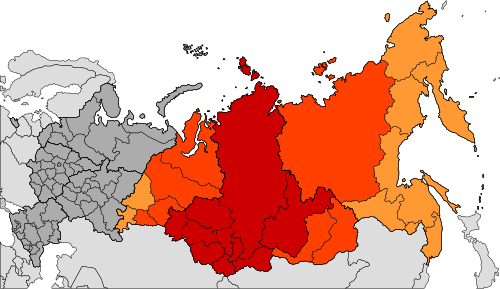|
WEEDLORDBONERHEGEL posted:There are a lot of universities in Tomsk. Or there are many universities in Tomsk. No definite article with names of cities. No. I am not religious. I am ateist (secularist or antitheist ?)
|
|
|
|

|
| # ? Apr 24, 2024 12:57 |
|
Lord Windy posted:Do you have anyone to practice speaking English with? Yes, I have.
|
|
|
|
Booger Presley posted:Thanks for sharing stories and information about your home. I've always had a stereotyped opinion about Siberia and you are opening my eyes to many more interesting things about the region. We organize rescue operations competition two times in a year. Yes, but it was terrible. I want that there were no extreme situations and people didn't suffer.
|
|
|
|
DeathSandwich posted:Do you ever get the chance to listen to or watch American or Western European music or movies? If so, are the movies from English speaking areas primarily re-voiced to Russian or is it English speaking with Russian subtitles? If you do get chances to watch English or American movies or listen to their music, do you have any particular favorites? We listen and watch American and Western European movies and music. Movies from English speaking areas are re-voiced to Russian. I like Nightwish. This is websit of our movies theater: http://kinomax.tomsk.ru/afisha/ Our city have access to food/restaurants from other ethnicities. In our city there are restaurants of Japanese cuisine, Italian cuisine. For example: delivery of sushi to the house http://tomsk.mirsushi.com/ http://www.dostavka-sushi.tomsk.ru/ http://tomsk.yakudzasushi.ru/ delivery of pizza to the house: http://italpizza.tomsk.ru/index.html http://makelovepizza.ru/ Bamboo restaurant's photo    
utjkju fucked around with this message at 12:51 on Feb 11, 2014 |
|
|
|
utjkju posted:No. I am not religious. I am ateist (secularist or antitheist ?) The word is "atheist". As far as I understand, "secularists" aren't the same thing as atheists, they are people who care more about the human condition and society than they care about religion or spiritual means. They may still believe in those kinds of things, but they put humanity first and don't take their religion (or lack of religion) into consideration when making most decisions. With that being said, most people who describe themselves as "secular" are also atheists, but those words don't always mean the same thing. "Antitheist" is rarely used unless referring to someone actively opposed to religion, not just someone who doesn't believe in god or a higher power. I really like this thread, thank you for posting! I agree that it's really interesting to see Russian speech patterns applied to English. I am a very basic Russian speaker and I'm sure whenever I type in Russian to people I have very English ways of forming sentences. 
|
|
|
|
Are there any black people (people with dark skin) in Tomsk?
|
|
|
|
Restaurant of Italian cuisine   
|
|
|
|
comaerror posted:This thread has been very informative, thank you. I saw English movies without subtitles. But it won't teach to write. 
utjkju fucked around with this message at 12:55 on Feb 11, 2014 |
|
|
|
echopapa posted:Do you enjoy sports? I know that there are football* and hockey teams in Tomsk. Yes, we enjoy sports. There are volleyball, basketball, rhythmic gymnastics, track and field athletics, weightlifting, acrobatics, yoga, fighting arts, swimming, riding and other sports.
|
|
|
|
JoshGuitar posted:привет! Recipe of test of vareniki and pelmeni: eggs, water or milk, flour, salt. Stuffing of vareniki: berries, cottage cheese, potatoes, apple. Stuffing of pelmeni: ground meat. Pelmeny  Vareniki  Recipe of test of pierogies: eggs, sugar, salt, flour, milk or water, yeast. Stuffing: berries, cottage cheese, cheese, potatoes, ground meat, jam, apple. Pierogies are fried or baked. Pierogies  Manty is big pelmeny. Forcemeat in manty is fatter than ground meat in pelmeni. Forcement for manty have more onion than ground meat for pelmeni. Pelmeny and vareniki cook in water. Manty is steamed. Manty  For Easter we cook kulichi. These are tasty sweet rolls. Kulichi  Also, the tasty dish is a holodec. Holodec utjkju fucked around with this message at 09:37 on Feb 12, 2014 |
|
|
|
Chiba City Blues posted:The word is "atheist". Thank you!
|
|
|
|
The Scientist posted:Are there any black people (people with dark skin) in Tomsk? Yes, there are black people. Generally it is students. utjkju fucked around with this message at 09:30 on Feb 11, 2014 |
|
|
|
utjkju posted:Recipe of test of vareniki and pelmeni: eggs, water or milk, flour, salt. The "pierogies" we usually have where I live are Polish pierogies, very similar to your varenyky. They are usually boiled and then covered with melted butter and fried onions, but I've had them pan-fried and deep fried before too. I occasionally ate Russian-style pierogies/pirozhki as a child, but my grandparents are all dead and nobody else in my family ever made them. The holodec looks a little scary to me  , but I definitely think I'll try making the other foods you mentioned, thanks. , but I definitely think I'll try making the other foods you mentioned, thanks.
|
|
|
|
utjkju posted:One day, the Czech man come to our rock-climbing club. The Czech did not spoke at Russian. But he knew English. We did not know Czech language. But we very very badly knew English. This reminds me of when I was on study abroad in Germany. I was living with three Germans and two Czech girls, one of whom didn't speak German or English very well, so the other would translate for her sometimes. On top of that, the German roommate that I hung out with all the time didn't speak English very well, so it got pretty amusing sometimes. Thankfully, I could speak German fairly well before I went, but communication could be pretty complicated from time to time. I also have to add that the food you posted looks delicious. I wish I could get good pierogis around here, because that would definitely be my lunch today. The restaurants look really nice, too.
|
|
|
|
Chiba City Blues posted:The word is "atheist". It's more that an "atheist" is someone who doesn't believe in gods while a "secularist" is generally someone who wants to keep religion out of government and generally out of it's dominating role in a given culture. They overlap a lot but they are not the same thing. There are religious people who are secularists.
|
|
|
|
I think when you say forcemeat, you might mean sausage? I have never heard of forcemeat.
|
|
|
|
A while back, somebody here posted a link to a page with a bunch of supposedly real Latvian jokes. They were pretty dry and dark, and completely different from any kind of humor we're used to in America (or most other countries). A couple examples:quote:Man is hungry. He steal bread to feed family. Get home, find all family have sent Siberia! “More bread for me,” man think. But bread have worm. Anyway, my point is, you had a post on the first page of this thread with the "He argued with the instructor" joke; what other kinds of humor are common in Siberia? Can you tell a few jokes that are popular there?
|
|
|
|
The Scientist posted:I think when you say forcemeat, you might mean sausage? I have never heard of forcemeat. You'll find it in older cookbooks, but yes, think loose sausage--seasoned chopped or ground meat.
|
|
|
|
JoshGuitar posted:A while back, somebody here posted a link to a page with a bunch of supposedly real Latvian jokes. They were pretty dry and dark, and completely different from any kind of humor we're used to in America (or most other countries). A couple examples: All the best black Russian humour either has wordplay that doesn't translate well or requires indepth knowledge of political structure and historical characters.
|
|
|
|
JoshGuitar posted:A while back, somebody here posted a link to a page with a bunch of supposedly real Latvian jokes. They were pretty dry and dark, and completely different from any kind of humor we're used to in America (or most other countries). A couple examples: Those aren't authentic examples of humor from Latvia. My 5 seconds of research led me here: http://www.chrisconnollyonline.com/2013/04/195-history-and-origins-of-latvian-jokes.html quote:Latvian jokes began as an instant messenger conversation between me and Ky Henderson. I was writing a book about the three years I spent living in Latvia and Ky was an editor at a magazine. I was working on a chapter about the Latvians' trademark 'black humor' and I wrote a quick joke and messaged it to Ky. So basically, it's the same thing as a Russian person making jokes about the US that consist of references to cowboys and rap music, which I don't think would be considered examples of "American humor".
|
|
|
|
The Scientist posted:I think when you say forcemeat, you might mean sausage? I have never heard of forcemeat. I might mean mincemeat (right?). On the picture mincemeat?  I will correct my post. 
utjkju fucked around with this message at 04:16 on Feb 12, 2014 |
|
|
|
JoshGuitar posted:The holodec looks a little scary to me Holodec only looks scary. But it is tasty. It is meat in the jell. Jell for the holodec is cooked from (of?) the meat's broth. In the meat's broth add spices: bay a leaf, black pepper, salt, garlic. Then meat fill in the broth . Also broth with meat are cooled. Sometimes add gelatin.
|
|
|
|
JoshGuitar posted:A while back, somebody here posted a link to a page with a bunch of supposedly real Latvian jokes. They were pretty dry and dark, and completely different from any kind of humor we're used to in America (or most other countries). A couple examples: This are simple jokes.  -Write!!!.. -What?.. - Hello! I am Anna... - I am 16 years old.  Boiled water is always a little bit soup  Where leave childhood?  Who will drown, that won't swim any more in the sea There are joke-games. Replacement of letters by figures: "94НН03 С006Щ3НN3 П0К4ЗЫ8437, К4КN3 У9N8N73ЛЬНЫ3 83ЩN М0Ж37 93Л47Ь Н4Ш Р4ЗУМ! 8П3Ч47ЛЯЮЩN3 83ЩN! СН4Ч4Л4 Э70 6ЫЛ0 7РУ9Н0, Н0 С3ЙЧ4С Н4 Э70Й С7Р0К3 84Ш Р4ЗУМ ЧN7437 Э70 4870М47NЧ3СКN, Н3 З49УМЫ84ЯСЬ 06 Э70М. Г0Р9NСЬ. ЛNШЬ 0ПР393Л3ННЫ3 ЛЮ9N М0ГУ7 ПР0ЧN747Ь Э70." "The strange message shows, what surprising things our reason can do. Impressive things! At first it was difficult, but now on this line your reason reads it automatically, without reflecting on it. Be proud! Only certain people can read it."
|
|
|
|
utjkju posted:I might mean mincemeat (right?). Actually I think you might mean "hamburger" or "ground beef." Mincemeat is specifically a mixture of ground meat, spices, and dried fruits. I think of mincemeat as being a rather British dish, but I could be wrong about that. I don't think mincemeat is something you'd mix with onions and stuff in dumplings. I think you just mean hamburger or ground beef, both mean the same thing.
|
|
|
|
Hoover Dam posted:You'll find it in older cookbooks, but yes, think loose sausage--seasoned chopped or ground meat. Thank you! "Ground meat"! I read about "ground meat", "hamburger", "ground beef." Ground meat is best. Ground meat consist of the ground beef, ground pig meat (pork?), onion, black pepper, salt.
|
|
|
|
Pellisworth posted:Actually I think you might mean "hamburger" or "ground beef." Mincemeat is specifically a mixture of ground meat, spices, and dried fruits. I think of mincemeat as being a rather British dish, but I could be wrong about that. "mincemeat" or "minced meat" means the same thing in UK/AU/NZ as "ground meat" in the US. He's right, there are just different names for it depending on region. utjkju: this is a dumb question, but is the stereotype of Russians squatting (сидеть на корточках) all the time as true as I'm led to believe?
|
|
|
|
Excavation posted:"mincemeat" or "minced meat" means the same thing in UK/AU/NZ as "ground meat" in the US. He's right, there are just different names for it depending on region. This is not the true. There are people which we call "gopniki". If it is one person that we speak "gopnik". In Soviet period the phenomenon which we called "gop - stop" was developed. Gopniki purloined fur caps, mobile phones, bags and other things. It was brute force (outrage?). After 2000 decline "gop-stop" began. But in small cities or criminal districts you can meet gopniki. Gopniki (are?) squatting. It went from prison habits of gopnikov.   utjkju fucked around with this message at 16:01 on Feb 12, 2014 |
|
|
|
In English it's called "mugging".
|
|
|
|
Ahh thanks, I was thinking that it would be an exaggerated cultural trait much the same as "everything which we Australians claim to do" but I wasn't sure. Squatting in doorways/streets/nightclubs is one of those popular Russian stereotypes on the internet, and I wasn't sure close to reality it was because we don't have many Russians where I live. Thank you for answering such a stupid question! Do you have any more stories about bears?)) edit: also, here is a grammar tip: genitive case in russian = "of" or "from" + regular world in english, or the possessive of a proper noun (e.g. "Lenin's"/"of Lenin"/"from Lenin" = "ленина"). as usual, translation depends on context. i just noticed it from the gopnik explanation ("After 2000 decline "gop-stop" began") and thought i'd share that as it may be useful. Excavation fucked around with this message at 16:52 on Feb 12, 2014 |
|
|
|
This thread is fantastic, thanks so much for sharing. A few questions: 1. Was it difficult to learn the Latin alphabet? I can't read the Cyrillic alphabet but a lot of the letters look fairly close to Latin ones. Is it confusing when trying to read things in English? I know when I see я I think it's "R" in Latin although I don't think that's the appropriate translation. 2. How much "Olympic spirit" would you say Tomsk has? Is there a lot of interest in watching events? When Atlanta had the Olympics back in 1996 it felt like the entire country was hosting the games even though the events were only in one city. You couldn't walk outside without being bombarded with Olympic-related things. 3. Sochi wasn't a very well-known town to me before the Olympics. It seems like it's fairly well-known in Russia though. Is that accurate? Do many Russians travel there for vacations? 4. How do West and Central Siberia differ from Eastern Siberia/the Russian Far East? I've always wanted to visit Lake Baikal and Irkutsk because the photos I've seen are so beautiful. From what you've said Tomsk seems like a pretty normal Russian city with a focus on the timber and mining/resource extraction industries. Is that the case for other Siberian cities like Irkutsk, Vladivostok, etc? What about more remote cities like Yakutsk? 5. How is the transportation between cities in Siberia? I know the Trans-Siberian Railroad is a major artery but I've read that they've recently built a highway system (the M58 Highway or Amur Highway) that connects the Far East to the rest of Russia by road. I read about it here: http://en.wikipedia.org/wiki/M58_highway_%28Russia%29 Was the opening of this highway a big deal? Do most people heading to Moscow/Vladivostok/etc take the train? Do they drive? Do they fly? 6. I apologize in advance if this is sensitive or awkward question. What is the Russian view on the history of the Soviet Union? Additionally, in history textbooks what parts of Soviet history are emphasized? Is there an emphasis on the revolution/Lenin? (American textbooks spend a great deal of time detailing our war of independence against the British and our Civil War) What about later periods? In America the only Soviet-related things we learn are about World War II and the Cold War. Even the information we learn about that is very abridged. For example, the average American gets little knowledge about the Eastern Front in school. I don't even think my textbook talked about the Siege of Lenningrad/St. Petersburg despite it being a key part of the war. 7. Do you have any pets? Are dogs more popular than cats or is it the other way around? 8. If someone were to take a trip to Russia/Siberia where would you recommend they go? (other than Tomsk of course  ) )
|
|
|
|
Excavation posted:Ahh thanks, I was thinking that it would be an exaggerated cultural trait much the same as "everything which we Australians claim to do" but I wasn't sure. Squatting in doorways/streets/nightclubs is one of those popular Russian stereotypes on the internet, and I wasn't sure close to reality it was because we don't have many Russians where I live. Thank you for answering such a stupid question! Do you have any more stories about bears?)) Question is not a stupid. It is normal question. I have not any more stories about bears. I read grammar book. "Есть люди, которых мы называем гопниками. " У слова "гопниками" творительный падеж. Предлоги - by, with. Are these examples right? There are people which we call by "gopniki" In Soviet period the phenomenon, which we called by (with?) "gop - stop", was developed. utjkju fucked around with this message at 11:37 on Feb 13, 2014 |
|
|
|
utjkju posted:There are joke-games. This reminds me of a similar game in English. "Aoccdrnig to rscheearch at Cmabrigde Uinervtisy, it deosn't mttaer in waht oredr the ltteers in a wrod are, the olny iprmoatnt tihng is taht the frist and lsat ltteers be at the rghit pclae. The rset can be a toatl mses and you can sitll raed it wouthit porbelm. Tihs is bcuseae the huamn mnid deos not raed ervey lteter by istlef, but the wrod as a wlohe." As a non-native English reader, can you understand this? I can read it almost as quickly as I can read correct English. Here's the plaintext in a spoiler: According to research at Cambridge University, it doesn't matter in what order the letters in a word are, the only important thing is that the first and last letters be at the right place. The rest can be a total mess and you can still read is without problem. This is because the human mind does not read every letter by itself, but the word as a whole.
|
|
|
|
utjkju posted:Are these examples right? Ah, there is no need to use a preposition after the verb "to call" in this particular situation. Just "which we call gopniki" and "which we called gop-stop" are fine. However, you are absolutely right that you would often use with/by when translating words from the instrumental case! I hope that makes things less confusing.
|
|
|
|
axeil posted:This thread is fantastic, thanks so much for sharing. 1. It was not difficult to learn the Latin alphabet. In beginning school (beginning education?) we learn the Latin and the Greek alphabets on the lessons of the mathematic. Some symbols of the mathematic are the Latin and the Greek letters. It is not confusing when trying to read things in English. I know that i read in English. Therefore I do not confuse the Latin alphabet with the Cyrillic. 2. "Olympic spirit" is strong. Yes, there is a lot of interest in watching events. Two sportsman from Tomsk compete in Olympic game: Anna Mirtova, Ekaterina Stoliarova. 3. Sochi is the city near Black sea. It is the biggest city of health-resorts in Russia. Yes, many Russians travel there for vacations. 4. Central Siberia is an extensive geographical region, consisting of almost all of North Asia. Siberia has been part of Russia since the seventeenth century. The territory of Siberia extends eastwards from the Ural Mountains to the watershed between the Pacific and Arctic drainage basins. Siberia stretches southwards from the Arctic Ocean to the hills of north-central Kazakhstan and to the national borders of Mongolia and China. Siberia is 77% of Russia (13.1 million square kilometres), but has just 28% (40 million people) of Russia's population. (http://en.wikipedia.org/wiki/Siberia)  West Siberia extends eastwards from the Ural Mountains to the Yenisei River in the east. East Siberia - the part of Siberia, which includes the territory of Russia from Yenisei in the West to the watershed between the Pacific Ocean in the east. The Far East is the Russian part of the Far East, i.e. the extreme east parts of Russia, between Lake Baikal in Eastern Siberia and the Pacific Ocean. The Far Eastern Federal District, which covers this area, borders with the Siberian Federal District in the west. (http://en.wikipedia.org/wiki/Russian_Far_East) Vladivostok and Irkutsk is bigger cities than Tomsk. Yakutsk is a big city. But this city is less than Tomsk. 5.Most people heading to Moscow/Vladivostok/etc fly by plane. But you can take the train or drive. Construction of road is always big deal. 6. We learn all history of our country: from time before formation of Russia to new history (today). Each period of our history is detailed discussed. We learn the positive parts and the negative parts of each period of the Russian history. We do not mean about Soviet Union that it was only bad or only good. In the Soviet period there were the positive parts and the negative parts. 7. I have a pet. My pet is the hamster. Dogs are as popular as cats. 8. I need of information about hobby of the person for recommendations about a trip to Russia/Siberia. utjkju fucked around with this message at 08:06 on Feb 13, 2014 |
|
|
|
Ensign Expendable posted:In English it's called "mugging". Thank you!
|
|
|
|
Excavation posted:Ah, there is no need to use a preposition after the verb "to call" in this particular situation. Just "which we call gopniki" and "which we called gop-stop" are fine. However, you are absolutely right that you would often use with/by when translating words from the instrumental case! I hope that makes things less confusing. Thank you! I understood the translation of Russian cases in English. May be... 
|
|
|
|
AATREK CURES KIDS posted:This reminds me of a similar game in English. I could not read only this word "rscheearch". I did not know how to write "research". Now I know. 
|
|
|
|
utjkju posted:I could not read only this word "rscheearch". Oops, looks like I typed "rscheearch" wrong. It should have been more like "rseearch".
|
|
|
|
AATREK CURES KIDS posted:Oops, looks like I typed "rscheearch" wrong. It should have been more like "rseearch". I don't think it really matters in this case.
|
|
|
|

|
| # ? Apr 24, 2024 12:57 |
|
utjkju posted:Lots of good info Thanks for this! How much snow do you typically get per year?
|
|
|


















